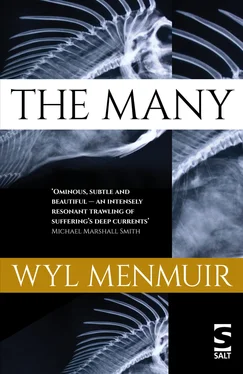Wyl Menmuir - The Many
Здесь есть возможность читать онлайн «Wyl Menmuir - The Many» весь текст электронной книги совершенно бесплатно (целиком полную версию без сокращений). В некоторых случаях можно слушать аудио, скачать через торрент в формате fb2 и присутствует краткое содержание. Год выпуска: 2016, Издательство: Salt, Жанр: Современная проза, на английском языке. Описание произведения, (предисловие) а так же отзывы посетителей доступны на портале библиотеки ЛибКат.
- Название:The Many
- Автор:
- Издательство:Salt
- Жанр:
- Год:2016
- ISBN:нет данных
- Рейтинг книги:4 / 5. Голосов: 1
-
Избранное:Добавить в избранное
- Отзывы:
-
Ваша оценка:
- 80
- 1
- 2
- 3
- 4
- 5
The Many: краткое содержание, описание и аннотация
Предлагаем к чтению аннотацию, описание, краткое содержание или предисловие (зависит от того, что написал сам автор книги «The Many»). Если вы не нашли необходимую информацию о книге — напишите в комментариях, мы постараемся отыскать её.
The Many — читать онлайн бесплатно полную книгу (весь текст) целиком
Ниже представлен текст книги, разбитый по страницам. Система сохранения места последней прочитанной страницы, позволяет с удобством читать онлайн бесплатно книгу «The Many», без необходимости каждый раз заново искать на чём Вы остановились. Поставьте закладку, и сможете в любой момент перейти на страницу, на которой закончили чтение.
Интервал:
Закладка:
19. Ethan
THE FOLLOWING MORNING the village descends again to the beach to find the waters have fallen away as suddenly as they had risen. Ethan, when he emerges from his house, is drawn down to the seafront like all the others, and he finds the beach crowded by the time he gets there.
The water was calm as they had entered the cove the day before, and from the sea, the village had looked like a different place entirely. They had secured the boats to the railings that ran in a line, like a fence bisecting a field of snow; the only indication there was when they returned of the boundary between the beach and the road.
The state of the café on the front shows the violence of the water’s retreat. Anne and two girls who help her out in the café stand huddled together outside the entrance amid the debris of tablecloths, salt cellars and menus that have been dragged out of the building by the retreating water. The door hangs uselessly, wrenched from its hinges. Further below scattered across the beach are the café’s chairs and tables. The two girls look to be the only thing holding Anne up, and they are talking to her in low voices, words he cannot hear. The sound of their voices is comforting and, not wanting to interrupt them, he walks around them in a wide arc.
The winch house is still standing, though it is as though the sea has tried to suck out its contents through the door. The machinery within has been uprooted and now blocks the doorway in a twisted confusion of metal. Ethan hears the sound of metal on metal from inside, and he looks in to see Clem has climbed in over the machinery blocking the door and is shifting things around in the darkness of the hut. As he gets closer, he sees that Clem is picking up whatever is loose and lying about on the floor and hurling it against the machinery, inflicting more damage on what is already damaged.
The waves on the shore are playing with empty crates and creels, pushing them up onto the stones and pulling them back again. The cove is littered with plastic bags, polystyrene blocks, floating on the oil-slick water, and they are slowly being sucked out through the mouth of the cove with the tide. Clem’s tractor, too, has been dragged down from its place at the top of the beach and it now sits a few metres out into the cove. Only the steering wheel of the tractor and the back of the driver’s seat are visible.
The Great Hope lies on the stones listing over to one side, as do the other boats that returned the day before. All the boats left on the beach have been dragged as far down the beach as the chains securing them to the railings will allow, and they strain on them like dogs against their leashes. All the loose ropes and chains attached to the dividing wall are also outstretched and are laid out in a series of parallel lines down the beach and on into the water. Ethan feels if he picked one of the lines up, he could pull the sea and the sky towards him.
It takes him a while to understand what is wrong with the scene, and at first he thinks he must be mistaken, but as his eyes follow the outstretched cables and ropes down towards the beach, he sees it is no longer the same beach, and the stones that make it up are no longer the same stones. It is as though while the space remains the same, it has been filled with items that are similar but not the same. He feels as though everything has been replaced by someone who knows this place well, but who has had to reconstruct it from memory. He looks around and the feeling compounds itself and although when he focuses on any one thing — the rocks at the mouth of the cove or the stones on the beach — and they match the image in his memory, he suddenly feels like a stranger in this place.
As he looks down on the beach he starts to feel panic welling up in him. And in between the outstretched ropes, pulling their way to the sea, he sees the first cracks. Thin black lines that run the length of the beach from where they emerge out of the water, up through the stones towards the concrete wall. The lines are barely perceptible and he wonders whether he is actually seeing them at all. He looks around to see if anyone else has noticed, but the villagers are going about their business and show no sign they have seen anything more unusual than the devastation left by the high tide.
He looks around for Timothy, as though Timothy might be the only person who might understand what he is experiencing, but Timothy is nowhere to be seen.
20. Timothy
TIMOTHY GOES THROUGH the house laying down sheets over the bare floorboards and, using the remaining dustsheets, he covers what remains of the ruined furniture and the walls as best he can.
He sits on the narrow mattress and fills the canvas bag that has been lying beneath the bed since he arrived. The bag has escaped the damage and he shoves in all the clothes that are not beyond repair and takes it down to the car, though as he emerges from the house he notices the passenger window has been smashed, more damage he had not seen before. He fishes out a shirt from the canvas bag, wraps it round his hand and clears the broken glass from the window frame and from the seats as best he can, though even as he does, he can see pools of broken glass accumulating in the seat well and around the handbrake. The damage does not appear, at first glance, to extend beyond the broken window and when he has cleared most of the glass, he places the canvas bag on the passenger seat and gets in at the driver’s door. He sits there for a while, looking back at the house with its door left swung wide open. There’s no point closing it. His shoulders sag and, feeling an emotion start to pass over him, the first tentative waves that lap at the shore as the tide turns its force upon the land, he twists the key.
The engine coughs, tries to turn over and gives up. He tries again and this time it coughs again, but more weakly, and the third time he tries it gives no response. He is calm at first and then the frustration rises in him faster than he thinks possible and when he opens the door to get out, he pushes it outward with enough force for something in the hinges to give. He leans against the door and then pushes it again with his full weight behind it and feels the mechanism break completely and he leaves it hanging from its frame like a broken arm.
Timothy walks between the house and the car several times, pacing between the two open doors, unable to pick one. Eventually, he reaches in through the smashed window and picks the bag from the passenger seat of the car and takes it into the house again.
Back inside, he places the canvas bag back on the bed, returns downstairs, pulls one of the remaining chairs over to the window in the front room and spends the rest of the day staring out at the sea.
The next day he walks down into the village and places a card on the noticeboard outside the village store, which is far enough back from the seafront to have escaped the high waters and is still open for business. Then he walks back up to Perran’s and takes up the same position by the window again.
21. Timothy
THERE IS A knock at the door and Timothy stirs in his chair but does not move. There is another knock.
‘Heard you’ve got car trouble.’
The voice comes in through the kitchen, through the door he has not bothered to close. Timothy stands from the chair by the window and walks through to the back of the house where he finds Tomas, who is appraising the wreck of Timothy’s car. Timothy stares, wondering whether Tomas has come to gloat, or to see how the damage to the house looks in the light of day. In the nights since the break-in he has pictured all four of the skippers at the front of the mob that stormed the house, tearing down pictures and furniture.
Читать дальшеИнтервал:
Закладка:
Похожие книги на «The Many»
Представляем Вашему вниманию похожие книги на «The Many» списком для выбора. Мы отобрали схожую по названию и смыслу литературу в надежде предоставить читателям больше вариантов отыскать новые, интересные, ещё непрочитанные произведения.
Обсуждение, отзывы о книге «The Many» и просто собственные мнения читателей. Оставьте ваши комментарии, напишите, что Вы думаете о произведении, его смысле или главных героях. Укажите что конкретно понравилось, а что нет, и почему Вы так считаете.











